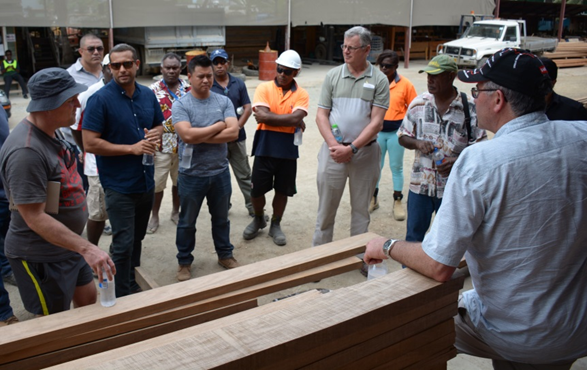Solomon Islands timber industry reaches agreement with New Zealand market
Last week the Solomon Islands sawn timber industry hosted a delegation of the New Zealand timber industry. Solomon Islands currently exports around SBD 23 million (NZ$4 million) of sawn timber to New Zealand each year with the value of the trade having increased significantly over the past 10 years.
The New Zealand delegation comprised some of the main buyers of Solomon Islands sawn timber. All are members of the New Zealand Imported Tropical Timber Group (NZ ITTG), which includes timber importers, retailers and conservation organisations such as Greenpeace (also on the trip). New Zealand ITTG members work with producers to actively seek and develop sources of sustainably managed tropical timber.
As in many parts of the world, New Zealand consumers want assurances that the timber products they buy have been sourced from legally and sustainably managed forests. Australia and New Zealand, which are the two main markets for sawn timber from Solomon Islands, both require some form of legality assurance for market entry.

Members of the Solomon Islands and New Zealand sawn timber industries meeting in Honiara
Systems to ensure the legality of timber sourced from Solomon Islands were the main topic of conversation during the visit. The Solomon Islands industry and NZ ITTG have agreed to collaborate on a number of initiatives to develop a system of third party legality assurance over the next two years. This will involve the establishment of an independent organisation that will audit sawn timber production to ensure that the source and legal production of timber can be demonstrated. This is seen as an important first step towards sustainable forest management.
In opening the meeting of the industry groups, the Permanent Secretary of the Ministry of Forestry and Research, Vaeno Vigulu, commented that “The sawn timber industry generates around SBD80 million in exports annually, and provides employment to more than 2,000 people working in sawmills and timber yards. The Solomon Islands government is committed to taking measures to ensure that Solomon Islands’ access to the Australian and New Zealand markets continues.”
Malcolm Scott, Chair of the NZ ITTG said, “New Zealand has imported Solomon Islands timber for many years and we have a very good relationship. However the market internationally is changing, and we need all our suppliers including Solomon Islands to meet international requirements on legal origin and sustainability. We are committed to working with our partners to that goal and we will need to see solid progress to ensure Solomon Islands timber can continue to be imported into New Zealand.”
A representative of the Solomon Islands timber industry said, “Much of the sawn timber going to New Zealand is from community managed forests. Many people only cut down 1 or 2 trees every now and then to pay for school fees. That said, we all need to recognise changing consumer demands and the need to demonstrate compliance with market requirements for legality and sustainability.
The industry visit was facilitated by the Pacific Horticultural and Agricultural Market Access (PHAMA) Program. The PHAMA Program is an Australian aid project, funded by the Australian and New Zealand Governments. It works across five countries in the Pacific, with PNG to join the Program in 2015/16. In Solomon Islands PHAMA is working with the private sector and government on helping improve the cocoa, fish, horticulture, coconut and timber industries. This initiative is part of a wider program of support that PHAMA is providing to strengthen the sawn timber industry in Solomon Islands.
Contact:
Mr Andrew Sale
PHAMA National Coordinator in Solomon Islands
Phone: +677 22384
Email: a.sale@phamaplus.com.au

